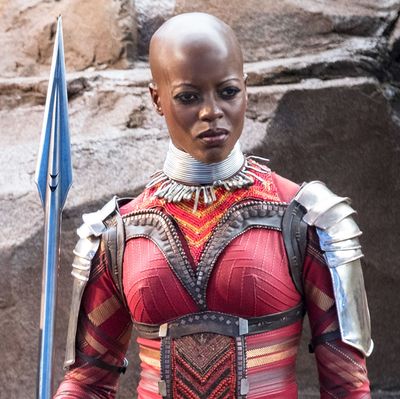
Black Panther is justifiably being hailed as a victory for onscreen representation. Its nearly all-black cast is unprecedented for a tentpole blockbuster, and its deep bench of richly detailed female figures is another victory for groups who are often given short shrift at the box office. But one thing it lacks is openly queer characters. This has caused a bit of frustration among fans of Black Panther comics, who point out that one of the film’s minor characters, Ayo, is a woman who has a romantic relationship with another woman in series like the Ta-Nehisi Coates–written Black Panther and the Roxane Gay–written Black Panther: World of Wakanda. In the film, she’s played by actor Florence Kasumba, and shows no signs of romantic involvement with anyone.
Last April, Vanity Fair writer Joanna Robinson reported that she’d seen footage from Black Panther in which Ayo flirts with Okoye (Danai Gurira), a fellow member of King T’Challa’s elite Wakandan warrior squadron, known as the Dora Milaje. A few hours later, a Marvel representative said their relationship was not intended to be romantic, but the rumor of romance reappeared earlier this week. E. Oliver Whitney of ScreenCrush asked the film’s co-writer, Joe Robert Cole, about whether the script ever showed Okoye and Ayo as being involved, and Cole said, “I think the short answer is yes,” but that he couldn’t remember the scene Robinson wrote about.
Vulture caught up with Kasumba and asked her about all of this, and she seemed to say the scene existed, but that it was cut for reasons she wasn’t privy to:
The thing is, if the makers would have wanted everyone to see the scene, it would have been in the movie. The final result that we’ve seen, there were a few scenes that have been cut. Different scenes, also. They didn’t make it into the movie for certain reasons, and at that point, I have to say: What their reason is, I can’t tell you, because nobody told me about whether it’s in or not.
But at this point, I personally think people have no idea who T’Challa is, who are the Wakandans, what is Wakanda, where is Wakanda, what is their culture. There are so many important things that had to be told in these two hours. So the focus was on what is so important for T’Challa. What happens after the last movie that we saw. I know all the other scenes that we have also filmed that are not in the movie. People have their reasons why not.
Vulture then asked her if she, personally, would have liked to see Ayo’s sexuality played out in the film’s universe. She replied:
I’d love to, at some point. Not now, because it’s too soon. At this point, the focus is somewhere else. I started reading World of Wakanda towards the end of filming and I loved reading the comics. I loved reading about, Okay, how do the Doras become Doras? … That’s the whole reason why we had a boot camp [to train for the movie]: In order to be physically able to move as a unit. That was more important. That’s what I’m saying, right? Who is in love with whom and whatever — that was not important in this movie.
It’ll be interesting to see whether Marvel decides to display Ayo’s queer identity in future films. On the one hand, there’s a bit of conventional wisdom that non-straight characters don’t play well in blockbusters, especially internationally. But on the other hand, Black Panther has already demonstrated that conventional wisdom is made to be defied.

